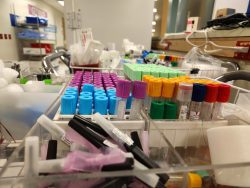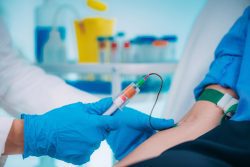Mastering Phlebotomy: Skills and Responsibilities for a Career in Gilbert AZ
Phlebotomy is a critical component of healthcare, involving the skilled collection of blood samples for diagnostic testing. Phlebotomists play a pivotal role in ensuring the accuracy of laboratory results and the overall well-being of patients. Let’s explore the essential skills and responsibilities that define this vital healthcare profession and how Phlebotomy Response Team’s Phlebotomy Training Academy is setting its students up for success.
1. Venipuncture Proficiency: Phlebotomists must master the art of venipuncture, possessing the knowledge and skill to locate veins, insert needles, and draw blood efficiently and safely.
2. Communication Skills: Effective communication is key in phlebotomy, as phlebotomists interact with patients of diverse backgrounds and ages. Clear communication helps alleviate patient anxiety and ensures accurate medical information exchange.
3. Attention to Detail: Precision is paramount in phlebotomy. Phlebotomists must carefully label specimens, adhere to strict protocols, and maintain accurate records to prevent errors and ensure sample integrity.
4. Problem-Solving Abilities: Phlebotomists encounter various challenges during blood collection, such as difficult veins or patient reactions. They must be adept at problem-solving, finding solutions quickly and efficiently to ensure successful blood draws.
5. Compassionate Patient Care: Beyond technical skills, phlebotomists provide compassionate care to patients. They must exhibit empathy, patience, and professionalism, creating a supportive and comfortable environment during blood collection procedures.
Responsibilities of a Phlebotomist:
1. Blood Collection: The primary responsibility of a phlebotomist is to collect blood specimens from patients accurately and safely, following established protocols and procedures.
2. Specimen Handling: Phlebotomists are responsible for labeling, storing, and transporting blood specimens to the laboratory for analysis, ensuring proper chain of custody and specimen integrity.
3. Quality Assurance: Phlebotomists play a vital role in maintaining the quality and accuracy of laboratory results.
4. Recordkeeping: Phlebotomists maintain detailed records of blood collections, including patient information, test orders, and specimen documentation, ensuring regulatory compliance.
5. Continuing Education: Phlebotomists engage in ongoing education and professional development to stay current with best practices and advancements in the field.
Phlebotomy requires a unique blend of technical expertise, interpersonal skills, and dedication to patient care. Phlebotomists serve as frontline healthcare professionals, contributing to accurate diagnosis, treatment, and disease management through their skilled blood collection practices. By mastering the skills and embracing the responsibilities of phlebotomy, these healthcare heroes play a vital role in promoting the health and well-being of patients and communities.




